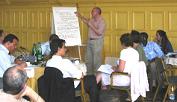The growth of civil society has been one of the most significant trends in international development. This website will provide you with information and materials on the World Bank's evolving relationship with civil society.
The 2013 Spring Meetings of the International Monetary Fund and the World Bank will be held during April 19-21 in Washington, DC. As in previous years, the Civil Society Policy Forum, a program of policy dialogues for civil society organizations (CSOs) will be held on April 17 – 20, 2013. The Program will bring together IMF and WBG staff, CSO representatives, government officials, academics, and others to exchange views on a variety of topics ranging from safeguards, energy policy, and post-MDGs. The online registration to attend the meetings is now closed.



The World Bank first began to interact with civil society in the 1970s through dialogue with non-governmental organizations (NGOs) on environmental concerns. Today the World Bank consults and collaborates with thousands of members of Civil Society Organizations (CSOs) throughout the world, such as community-based organizations, NGOs, social movements, labor unions, faith-based groups, and foundations.
The World Bank has learned through these three decades of interaction that the participation of CSOs in government development projects and programs can enhance their operational performance by contributing local knowledge, providing technical expertise, and leveraging social capital. Further, CSOs can bring innovative ideas and solutions, as well as participatory approaches, to solving local problems.
The overview section of this website provides information on the Bank’s evolving relationship with civil society. It contains five sections: Background on the history and current status of World Bank civil society relations; Approach of the Bank’s work with civil society; evolution, definition, and characteristics of Civil Society worldwide; Staff which work with civil society; and Frequently Asked Questions about the Bank’s work with civil society. In addition, the Issur brief is an overview of the Bank's engagement with civil society.
Copyright © Civil Society Association of Pakistan. All Rights Reserved.